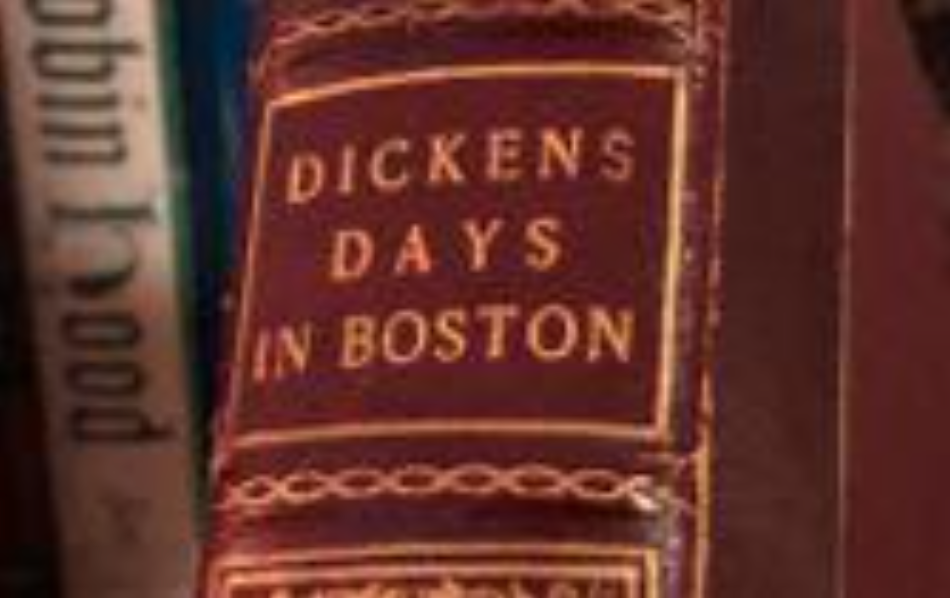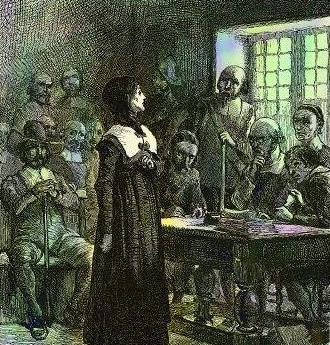Mercy Otis Warren has been called the most accomplished female mind of the American Revolution- so why isn’t she better remembered? To be sure, she isn’t entirely forgotten. She is well known and celebrated in certain circles, particularly in New England: her statue flanks the entry to the County Courthouse alongside that of her brother, James Otis Jr., in their hometown of Barnstable on Cape Cod. Indeed, the Cape Cod “Woman of the Year Award” is named after Mercy Otis Warren.
She is a posthumous inductee into the Seneca Falls Women’s Hall of Fame, and even had a naval ship named in her honor in the World War II era (lowly cargo vessel though it was). Best of all, Mercy can be visited in the Museum of Fine Arts, where a spirited portrait of her by John Singleton Copley hangs amongst his pantheon of revolutionaries in the Art of the Americas wing: Samuel Adams, John Hancock, Paul Revere et al.
But despite these mostly local flowers, a greater national fame eludes her. Her friend and contemporary Abigail Adams, for example, enjoys greater cache both in Massachusetts and nationally. It was not Mercy but Abigail whom sculptor Margaret Bergmann chose to depict in her Boston Women’s Memorial that was unveiled in 2003 on the Commonwealth Ave Statue Mall (though Mercy’s name does appear; she’s listed as the recipient of the letter from which one of the Abigail quotes engraved on her stele was pulled).
It seems unlikely that Bergmann ever considered opting to pair Mercy alongside Phillis Wheatley and Seneca Falls organizer Lucy Stone in that memorial, just as it seems unlikely that Mercy will ever receive a significant on-screen portrayal of any kind, let alone a star turn the caliber of Laura Linney’s Emmy Award winning Abigail in HBO’s John Adams miniseries. Mercy wasn’t included as a character in John Adams, though she hosted, corresponded with, counseled and/or mentored half the people who were so included.
Still, it’s hard to argue tiering Abigail above Mercy- Abigail is both our first Second Lady and our second First Lady, after all. But much of that status she owes to her relationship with her husband, first VP and second POTUS John Adams. James Warren, on the other hand, gave Mercy Otis his last name and then largely got out of the way.
Abigail displayed her intellect and proved an excellent counselor to John in their much-loved correspondence, admonishing him to “remember the ladies”- but we appreciate this mostly in retrospect; whatever influence this may or may not have had on John Adams, it was between the two of them, private correspondence that remained private until many years later. Mercy, on the other hand, would step beyond personal correspondence and insert her ideas directly into public discourse. Her pamphlets and plays would influence events as they unfolded. She would enter the political arena of the revolution and utilize the same tools of the essayists and pamphleteers whose portraits hang alongside hers.
Mercy Otis Warren didn’t accomplish this in a vacuum; she was prepared for her revolutionary moment by an education unavailable to most women. She was fortunate to enjoy the support of a brace of James’: Her father, James Otis Sr., her brother James Jr., and her husband James Warren.
James (Otis) Jr. was extremely close with his sister, and after middle sibling Joseph begged off from tutoring with Reverend Jonathan Russell, James campaigned successfully to his father that Mercy should take Joseph’s place. Reverend Russell, uncle to the Otis children, was preparing the boys for Harvard and the chance to attend these lessons represented a tremendous opportunity for Mercy. Like an incoming Harvard student, she would learn to read Latin and Greek in preparation for a classical education.
Her uncle further encouraged her by giving her the run of his library. Mercy would become versed in Greco roman history and Shakespeare, Milton, and Sir Walter Raleigh. Years later, she would lampoon loyalist Governor Thomas Hutchinson by naming him “Rapatio”- a fine moniker for a villain, Rapatio would be right at home with Borracio amongst Don Juan’s rogue’s gallery in Shakespeare’s Much Ado.
Although Mercy could not follow James Jr. to Harvard, he would serve as her proxy there. The siblings were extremely close and shared a great deal (family tradition even has him correctly predicting to her his eventual death in a flash of lightning.) Through James Mercy was exposed to much of what James learned at Harvard, particularly the philosophy of John Locke. And at Harvard Commencement, she would become acquainted with a classmate of her brothers named James Warren, though the two would not marry until more than a decade later.
Her proximity to her brother would continue to provide education for Mercy; when he became embroiled in the Writs of Assistance Case, she received a master class in contemporary politics.
James Jr., infuriated that a place on the Massachusetts Supreme Court had been denied to his father and granted instead to legal neophyte Thomas Hutchinson, went on the attack in 1761. He resigned his post as advocate general of the Admiralty Court and fought the Writs and the expanded search powers they gave the Customs officials. He entered the case as a volunteer attorney, saying “in such a case, I decry a fee”. His fiery four-hour speech, credited with introducing “taxation without representation is tyranny” concept, failed to win the case but transformed the dynamic in Massachusetts and the colonies at large- and, it hardly need be added, it transformed Mercy as well.
In a few short years, her first published satire would feature thinly veiled portraits of James Otis and Thomas Hutchinson as hero and villain. Mercy had married James Warren and the two settled into a house that still stands in Plymouth, known today as the Winslow Warren House. James Warren was no less interested in politics than Mercy, and soon their home became a watering hole to the most incendiary of their fellow Whigs, later famous figures of the American Revolution: John Hancock, Samuel Adams, and of course Samuel’s second cousin John Adams and his wife Abigail, with whom Mercy would form a lifelong though occasionally tumultuous relationship.
In 1769, James Otis Jr. received a severe head wound in a barroom brawl with a tax official John Robinson, who James had referred to in print as a “superlative blockhead”. James Otis Jr. had always been subject to violent mood swings, and whether because of his wound or not, he now suffered a visible decline in his mental state. Mercy’s own assessment was “Though the wounds did not prove mortal, the consequences were tenfold worse than death.” The impact that this must have had on Mercy is incalculable, and it may have been the fall of her beloved sibling from his place in the opposition that spurred Mercy to launch her writing career and fill his place.
In 1772, Mercy Otis Warren’s satirical play The Adulateur was printed in the Massachusetts Spy, a paper so radical that it would later sport a masthead featuring a snake that had seemingly been chopped to bits, with the initials of one of the colonies by each segment and the bold words “Join or Die”. It was printed by Isiah Thomas in his printing house above Hopestill Capen’s dress shop, in a building that is now home to America’s oldest restaurant, the Union Oyster House. The Adulateur was printed anonymously; though by no means uncommon at the time, this was likely in part to conceal her identity as a woman, though in the Sons of Liberty inner circle her authorship was well known.
Mercy’s drama of the struggle between “Rapatio” and “Brutus” in a land known as “Upper Servia” was well received, and the nicknames for Otis and Hutchinson found their way into the writings of other whigs. “Rapatio” would return in a 1773 sequel, Defeat, this time published from Samuel Adams’ own mouthpiece, the even more radical Boston Gazette. This time around “Rapatio” was sketched even more darkly, bribing his followers to maintain their loyalty. Mercy would also publish a poem in the Gazette to celebrate the destruction of tea. John Adams, who had already described the event as “an epoch in history”, directly solicited Mercy for a mythic poem about it, “a frolic among the sea-nymphs and goddesses.” Mercy obliged with “The Squabble of the Sea-Nymphs,” published again in the Gazette in 1774 as an imagined dialogue between Neptune’s wives.
Mercy’s pen grew bolder with each new work: in “Squabble” she advocated defiance against “the pimps and sycophants of George’s reign, and in a letter James Warren wrote to John Adams in Philadelphia that advocated drastic steps by the Continental Congress, she insisted on inserting a paragraph of her own in which she admonished John not to “piddle on the Threshold”.
With the outbreak of war Mercy shifted her focus to serving as James Warren’s personal secretary during his stints as President of the Provincial Congress and as paymaster of the Continental Army, though the plays and poems would continue. She maintained a now vast correspondence with many revolutionaries during this time, providing John Adams at the Congress with reports of goings on in Massachusetts. Her pen had lost none of its potency with the success of the war: in 1788 she published Observations on the New Constitution, a pamphlet that was critical of the Constitution and called for a Bill of Rights. It was published under a penname, “A Colombian Patriot”, which again mirrored the modus operandi of Samuel Adams, who like other writers of the time utilized pseudonyms such as “Candidus” and “Vindictus”. As usual, though, her identity was well known and inner circles and her anti federalist stance contributed to a breach with John Adams.
In 1790 Mercy published a collection of poems under her own name, (making her only the third American woman to do so after Anne Bradstreet and Wheatley) including previously published works that were previously anonymous. Now under her own name she would produce her magnum opus: the massive three volume History of the Rise, Progress, and Termination of the American Revolution.
Thomas Jefferson corresponded with Mercy during her work on her history, and purchased a subscription for not only himself but all members of his cabinet. Jefferson informed Mercy of his expectation that she would produce a work “useful to our country; honourable to herself“, entrusting her to record “a more instructive lesson to mankind than any equal period known in history.”
Predictably John Adams did not come off as well as Jefferson in Mercy’s Anti Federalist history. Adams had once said of Mercy, “God Almighty has entrusted her with the Powers for the good of the World, which, in the cause of his Providence, he bestows on few of the human race. That instead of being a fault to use them, it would be criminal to neglect them.” Now he acidly remarked that “History is not the province of the ladies”.
While Adams was notoriously sensitive to criticism- his body shape had been mocked during his presidency when he was dubbed “his rotundity”- this comment serves as an important reminder of the patriarchal arena Mercy had now openly entered as a female writer: approval of her work could be withheld or withdrawn based purely on her sex.
Despite a pan from John Adams, Mercy’s History is remarkable not only as an early non fiction work by a woman, but also the only history of the American Revolution written by a participant who enjoyed access to Adams, Washington, and others. And despite the breach with federalists like Adams and Hancock, no less a federalist than Alexander Hamilton paid her writing a great compliment, remarking “In the career of dramatic composition at least, female genius in the United States has outstripped the male.” It would take long years, but Mercy at last became reconciled with John Adams in 1812.
Having survived her husband, her brother, and most of her children and contemporaries, Mercy Otis Warren died in 1814 at the age of 86. She is interred in Plymouth’s Burial Hill a stones throw away from the grave of Governor Bradford and a musket shot away from her longtime home, the Winslow Warren House. At the Museum of Fine Arts, her portrait deservedly hangs in line with those of Samuel Adams, John Hancock, and her brother in law Joseph Warren. Perhaps as history is approached with an increasing eye to diversity, her name will more often be counted alongside theirs as well.
More Blogs
- Boston Historical Tours
All Blogs Hat Tip to the LOLs The remarkable tale of Margaret Hamilton is one of the highlights of our Innovation Tour. Hamilton was Director of Software Engineering for NASA’s Apollo program.
- Boston Historical Tours
All Blogs Hat Tip to the LOLs The remarkable tale of Margaret Hamilton is one of the highlights of our Innovation Tour. Hamilton was Director of Software Engineering for NASA’s Apollo program.
- Boston Historical Tours
All Blogs Dickens and a Christmas Carol Come to Boston A long time ago, longer than I would care to admit, I was asked to develop a Christmas themed tour for a
- Daniel Berger-Jones
All Blogs Anne (Marbury) Hutchinson Anne Hutchinson, puritan, wife, mother, midwife and top notch rabble-rouser. If you’ve never heard of her, it’s not your fault, probably… Anyway, I don’t know if she



